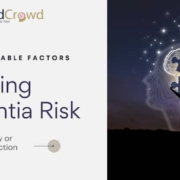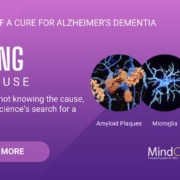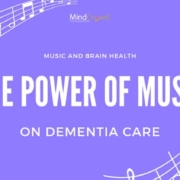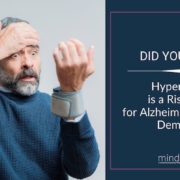Sleep and Dementia Prevention: Improving Brain Health
How does poor sleep increase the risk for Alzheimer’s? Does lack of sleep cause Parkinson’s dementia? Discover the impact of sleep on brain health.
Lack of sleep doesn’t cause Alzheimer’s disease, but it can increase your risk. Especially if you deprive yourself of sleep for long periods of time.
Appropriate amounts of sleep are important for brain health. In fact, sleep disturbances can increase the risk for cognitive decline and brain diseases, like Parkinson’s and Alzheimer’s.
Does Sleep Deprivation Increase the Risk for Alzheimer’s?
We know that sleep is important to keep our brains healthy, even in the non-Alzheimer’s brain.
During wake periods some of the brain chemicals naturally build up in your brain. Some of them are directly tied to Alzheimer’s disease risk. Amyloids, for example, are also indicators or biomarkers of Alzheimer’s disease.
Recent research suggests that during sleep your brain uses the cerebral spinal fluid to wash away some of these toxins. Thus rejuvenating itself.

Beta amyloid production is a normal byproduct of brain function. Washing away some of that beta amyloid is an important part of brain health. You produce beta amyloid, you wash it away during sleep. If you are sleep deprived, it can lead to beta amyloid build up.
So, good, long, deep sleep is very important for the cleansing of your brain and lowering the risk of Alzheimer’s.
Can Deep Sleep Wash Away Tau Tangles?
Tau tangles are likely not washed away because Tau is inside of your cells and you can’t really wash them away. But beta amyloid is outside of the cells. Avoid the beta amyloid build up as best you can because scientists think that it is a risk factor for the creation of Tau tangles.
A study of a small group of young, healthy men study published in Neurology showed that when deprived of a single night of sleep they had higher blood levels of tau protein than when they had a full and uninterrupted night of rest.
While interesting, we cannot draw too many conclusions from this study. The take-home message is that sleep is important for brain health. Even one night of impaired sleep or sleep deprivation leads to an increase in biological markers known to be bad indicators for your brain health.
Sleep and Dementia Prevention: How Much Sleep do you Need?
Are you getting enough rest? The best advice is to follow the recommendations that exist right now for sleep. But everybody is different and sleep needs are personal.
Overall, you need more sleep when you’re younger and you need more sleep when you’re an older adult.
The American Academy of Sleep Medicine and The Sleep Research Society recommend:
| Age Group | Description | Recommended Hours of Sleep |
|---|---|---|
| Infant | 4–12 months | 12–16 hours per 24 hours (including naps) |
| Toddler | 1–2 years | 11–14 hours per 24 hours (including naps) |
| Pre-school | 3–5 years | 10–13 hours per 24 hours (including naps) |
| School Age | 6–12 years | 9–12 hours per 24 hours |
| Teen | 13–18 years | 8–10 hours per 24 hours |
| Adult | 18–60+ years | 7 or more hours per night |

Sleep and Dementia Prevention: Can Naps Prevent Alzheimer’s?
There’s no evidence that napping is preventative or that it results in the same type of cleansing that takes place during deep sleep.
What’s more, napping can interfere with a good quality nighttime sleep. You may enter the first or second phases of sleep but not cycle through the five phases of true sleep a few times.
Does Oversleeping Kill Brain Cells?
No, definitely not. But oversleeping can lead to a short term feeling of not being refreshed from your sleep.
You can make a difference.
Help us find out how to extend quality of life by keeping our memory + cognitive abilities for life.
If trouble sleeping is an early sign of dementia, will all who experience poor sleep end up with dementia provided they live long enough?
Trouble sleeping is not necessarily an early sign of dementia. But sleep issues are associated with various types of brain disease.
One of the strongest links can be found between sleep and Parkinson’s disease. Many Parkinson’s patients have sleep issues early on. Before they receive the official diagnosis of Parkinson’s disease.
If you interview these patients in depth and learn about their history, you will find that the majority experienced sleep problems many years before receiving their Parkinson’s disease diagnosis.
And, no. There is no guarantee that if you experience sleep issues you will end up with dementia, if you live long enough.
We know that changes in sleep patterns are linked to brain diseases. It does not mean that you are destined for dementia. It’s also not a guarantee that you have a brain disease.
But sleep disturbances are something you should talk about with your physician at your yearly checkup or well visit.
It could be stress or something along those lines. But if it’s enough to bother you, then it is enough for you to discuss with your doctor.
If this is the way you’ve been all your life, there is no reason to talk about it. Sometimes people think that sleep is not important enough to bring up to a physician. And say, “oh, I had a bad year of sleeping because of stress”. Well, a year is a long time, that’s a change.
Your doctor should know about anything that is a significant change for you. Such as not enough sleep or too much sleep or disruptive sleeping patterns.

Sleep Problems caused by Mood Disorders or Restless Leg Syndrome
People with restless leg syndrome have a higher chance of developing Parkinson’s disease.
Research shows that the same brain regions involved in Parkinson’s disease can manifest as restless leg syndrome. So, it’s the brain/body connection that’s showing up early as a sleep disorder that may eventually mature into Parkinson’s disease.
Not everybody that experiences restless leg syndrome will end up with Parkinson’s. It’s not a one-way street.
And there’s not a clear link through sleep between mood disorders and degenerative diseases like Alzheimer’s. The relationship is much stronger between restless leg syndrome and Parkinson’s.

Can you Manage Sleep Disturbances Caused by Dementia?
That’s a good question. Sleep disturbances caused by dementia need the special attention of a physician. Drugs can be prescribed to help with sleep.
But more importantly, and this is good advice for anyone regardless of having dementia or not, you need to have good sleep hygiene and good sleep routines.
Sleep hygiene means treat your bedroom like a bedroom and make sure you go to bed around the same time every night.
Have a routine and don’t confuse where you sleep with where you live other parts of your day.
- Don’t bring food to your bed or watch TV. Keep them separate.
- Keeping sleep hygiene is also making sure that the room is a peaceful space, not too dark, not too light.
- The bedroom needs to be at a good temperature – 68°F is the recommended temperature.
- And you need to have a routine when it comes to bed time. Keeping consistent is key.
The Sleep-Wake Cycle: Impact of Sleep on Brain Health
Sleep-wake cycle is a way of describing the process of sleep because sleep is not just on or off. You’re not asleep all of a sudden. Sleep has different cycles, different levels of sleep.
There is light sleep, slow wave sleep, deep sleep, and rapid eye movement or REM sleep. And then you cycle around. Basically, sleep is a process.
Sleep-wake cycle can be described as a washing machine. So sleep is not simply on/off. And we think your brain washes away toxins during non REM (NREM) cycles.
This is one reason why you shouldn’t worry if you don’t remember your dreams because this cleansing of your brain happens during non REM sleep. And dreams take place during REM sleep.

Improving Sleep: Circadian Rhythm
Your circadian rhythm is exactly that and it’s YOUR circadian rhythm. It’s specific to a person. This is why you find some people who are morning people and some who are evening people.
It’s best if you can live your life according to your circadian rhythm. One of the problems with our lives is that for some reason we’ve all decided the work day is 9:00 to 5:00.
For some people that’s great, for other people it would be best if they worked noon to midnight.
But if you don’t have to follow this routine, then it’s best to settle into your own circadian rhythm. You can determine your circadian rhythm by simply not using a wake alarm for a month. Learn to get up when you wake up and go to sleep when you’re tired. And that will indicate your normal circadian rhythm.
Some people believe observing how they used to sleep as children could point to their circadian rhythm. But this is not guaranteed because a circadian rhythm can change through a lifetime.
There’s advice from scientists recommending not to send teenagers to school so early. And studies show that if you have a later school day start test scores and classroom engagement improves. Thus, high schoolers would be better off because, in general, the teenage brain does not do well so early in the morning.
Sleep is a very interesting topic and it’s becoming the subject of more studies. Primarily because of all these cool little sleep devices we can wear to bed that can detect body movement and breathing. So, people are learning about their own sleeping habits by wearing those devices to bed.
Does Better Sleep Quality Compensate for Sleep Loss?
No. You can’t catch up on your sleep loss. You can’t pull an all-nighter and then expect to sleep more the next day and magically catch up. You will catch up eventually.
Depriving yourself of sleep for one night will have impacts on your physiology for many days. And you will feel it more, the more the age advances.
FIND OUT MORE ABOUT YOUR BRAIN.
Discover how it compares with others like you in 10 short minutes by playing the free online MindCrowd memory game.
And help scientists find new ways to protect our brains from memory loss as we age.
Stay Tuned for News about Brain Aging and How to Avoid Cognitive Decline.
Matt Huentelman is a neuroscientist and a human genetics researcher. His laboratory studies how the brain ages and explores various ways in which we can prevent brain aging and protect against diseases of the aging brain like Alzheimer’s disease. His lab is based at TGen in Phoenix, Arizona, and he is also the lead scientist for the MindCrowd project.
MindCrowd is an internet based study of the brain that anyone 18 years of age or older can join and it can be found at mindcrowd.org









In February last year, out of nowhere, my eyes became light sensitive, had slurred speech and I was diagnosed of Parkinson’s disease. I started out taking different drugs and the disease progressed but didn’t help much. I wish I would have known more about the relationship between sleep and dementia as I did experience trouble sleeping for years before my diagnosis. Hopefully others will read about the importance of sleep and brain health and get themselves checked out before it’s too late. You can prevent this!
Is there any data as to taking sleep meds causing dementia or alzheimers